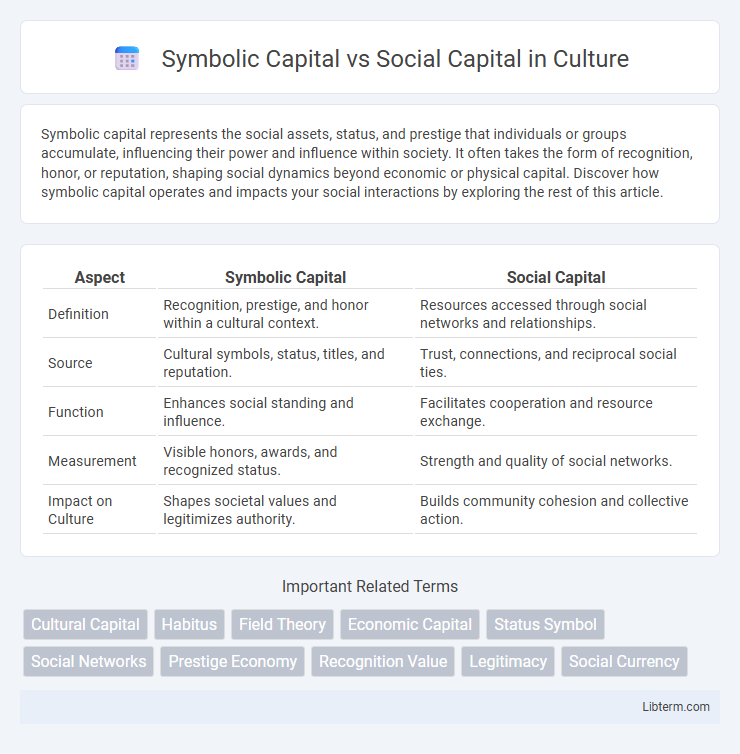Symbolic capital represents the social assets, status, and prestige that individuals or groups accumulate, influencing their power and influence within society. It often takes the form of recognition, honor, or reputation, shaping social dynamics beyond economic or physical capital. Discover how symbolic capital operates and impacts your social interactions by exploring the rest of this article.
Table of Comparison
| Aspect | Symbolic Capital | Social Capital |
|---|---|---|
| Definition | Recognition, prestige, and honor within a cultural context. | Resources accessed through social networks and relationships. |
| Source | Cultural symbols, status, titles, and reputation. | Trust, connections, and reciprocal social ties. |
| Function | Enhances social standing and influence. | Facilitates cooperation and resource exchange. |
| Measurement | Visible honors, awards, and recognized status. | Strength and quality of social networks. |
| Impact on Culture | Shapes societal values and legitimizes authority. | Builds community cohesion and collective action. |
Introduction to Symbolic Capital
Symbolic capital refers to the resources available to an individual or group based on honor, prestige, or recognition within a social context, often derived from cultural, social, or economic capital. It plays a crucial role in shaping social hierarchies and power dynamics by conferring legitimacy and authority that are not directly measurable by wealth or social connections. Pierre Bourdieu introduced the concept to explain how symbolic value transforms and sustains social structures beyond tangible assets.
Understanding Social Capital
Social capital refers to the networks, relationships, and social trust that facilitate cooperation and collective action within a community or group. It enables individuals to access resources, information, and support through social connections, enhancing social cohesion and economic opportunities. Unlike symbolic capital, which represents prestige or recognition, social capital emphasizes the practical benefits derived from social interactions and shared norms.
Key Differences Between Symbolic and Social Capital
Symbolic capital refers to the prestige, recognition, or honor an individual or group holds within a society, often derived from cultural knowledge, titles, or status symbols. Social capital consists of the networks, relationships, and social connections that facilitate cooperation and access to resources or support. Key differences include symbolic capital's focus on reputation and legitimacy, while social capital emphasizes tangible social ties and collective action potential.
Historical Origins of Both Capitals
Symbolic capital, rooted in Pierre Bourdieu's theory, originates from historical contexts where prestige, honor, and recognition function as forms of power within social hierarchies. Social capital traces back to early sociological studies by scholars such as James Coleman and Robert Putnam, emphasizing networks, trust, and mutual obligations developed through collective historical experiences. Both capitals evolved from distinct historical processes shaping social structures, with symbolic capital linked to cultural dominance and social capital tied to community cohesion and cooperation.
The Role of Symbolic Capital in Societal Status
Symbolic capital plays a crucial role in societal status by representing prestige, honor, and recognition that individuals or groups accumulate through cultural, social, or economic achievements. Unlike social capital, which emphasizes networks and relationships, symbolic capital translates these connections into perceived legitimacy and authority within social hierarchies. This form of capital influences access to resources and opportunities by shaping reputational power and social esteem in various institutional contexts.
How Social Capital Shapes Community Networks
Social capital profoundly shapes community networks by fostering trust, reciprocity, and cooperation among members, which enhances collective action and resource sharing. It creates interconnected relationships that facilitate access to information, support, and opportunities, strengthening social cohesion and community resilience. Unlike symbolic capital, which centers on prestige and recognition, social capital emphasizes the value embedded in social ties that drive community development and collaboration.
Symbolic Capital in Cultural and Educational Contexts
Symbolic capital, as conceptualized by Pierre Bourdieu, refers to the prestige, honor, and recognition accumulated through cultural knowledge, credentials, and educational achievements, which grants individuals social legitimacy and power within specific contexts. In cultural and educational settings, symbolic capital manifests through degrees, titles, and participation in esteemed cultural practices that validate an individual's status and influence social mobility. Unlike social capital, which emphasizes networks and relationships, symbolic capital centers on the value embedded in cultural symbols and institutionalized recognitions that shape hierarchies and access to resources.
Social Capital and Its Impact on Economic Opportunities
Social capital, defined by the networks, relationships, and social interactions individuals engage in, profoundly influences economic opportunities by facilitating trust, cooperation, and information flow within communities. High levels of social capital enable access to resources, job referrals, and support systems that can enhance career advancement and entrepreneurial success. Studies indicate that regions with dense social networks often experience greater economic growth, reduced transaction costs, and improved labor market efficiency due to the embedded social trust and reciprocity.
Interplay Between Symbolic and Social Capital
Symbolic capital, comprising prestige, honor, and recognition, often transforms social capital, the network of relationships and social interactions, by enhancing individuals' influence within those networks. The interplay between symbolic and social capital creates a feedback loop where increased symbolic capital strengthens social ties, which in turn generate more symbolic capital through social endorsement. This dynamic relationship underpins power structures and social mobility within communities, organizations, and broader societal contexts.
Conclusion: Navigating Capital in Modern Society
Symbolic capital and social capital both shape power dynamics but operate through different mechanisms: symbolic capital relies on prestige, recognition, and cultural value, while social capital hinges on networks, trust, and social ties. Navigating modern society effectively requires leveraging symbolic capital to gain legitimacy and influence, alongside cultivating social capital to access resources and collaborative opportunities. Balancing these forms of capital fosters resilience and strategic advantage in complex social and professional environments.
Symbolic Capital Infographic

 libterm.com
libterm.com